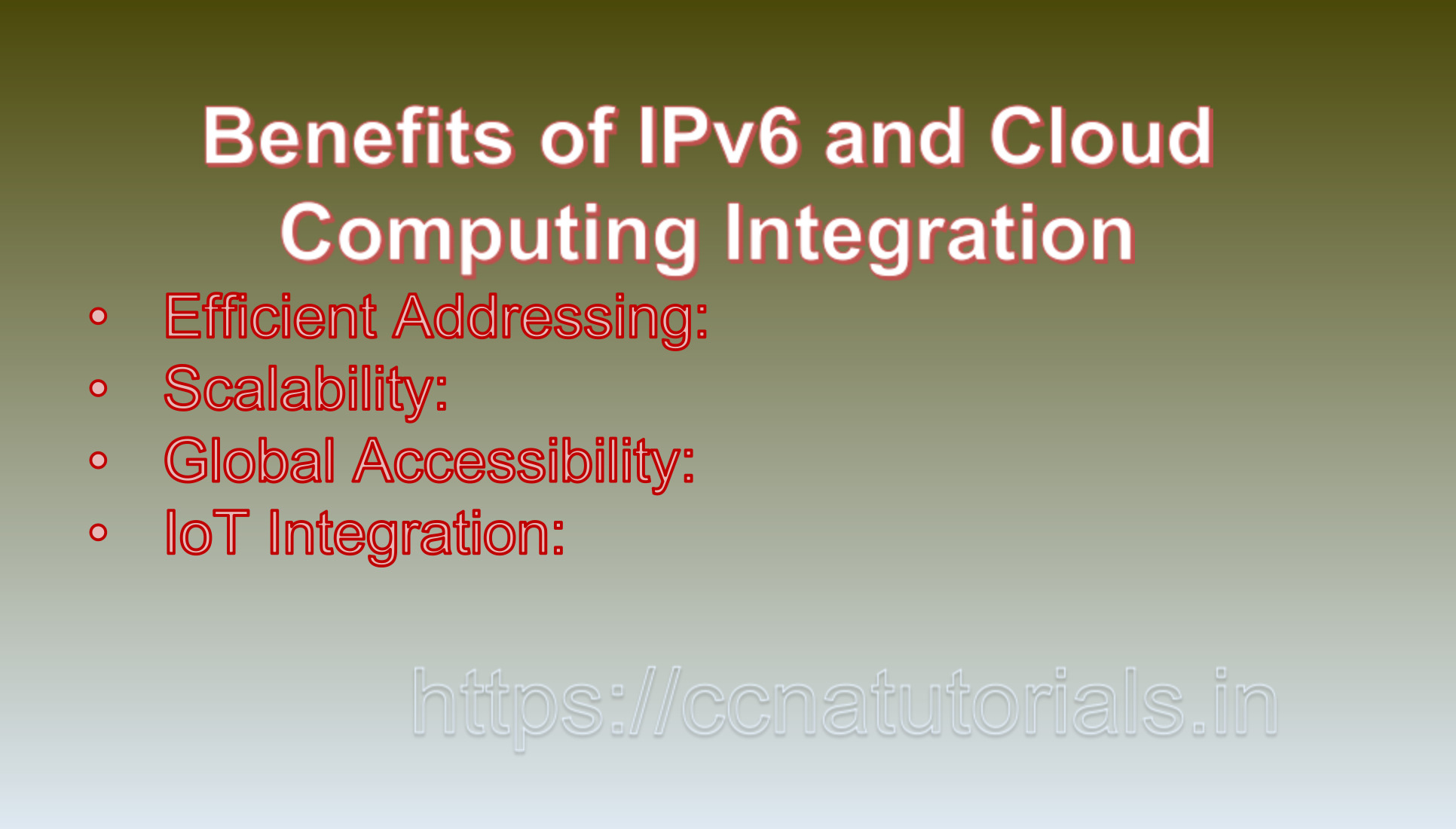Contents of this article
In this article, I describe IPv6 and Cloud Computing Enabling Scalable and Efficient Cloud Services. The integration of IPv6 (Internet Protocol version 6) with cloud computing represents a significant advancement in how computing resources are provisioned, accessed, and managed over the internet. Cloud computing involves the delivery of on-demand computing resources such as storage, processing power, and services over the internet. IPv6 enhances cloud computing by providing a larger address space, efficient routing, and support for the growing number of connected devices. In this article, we will explore the synergy between IPv6 and cloud computing, their benefits, implementation considerations, and provide examples to illustrate their importance in modern IT infrastructure.
Understanding IPv6 and Cloud Computing
IPv6: IPv6 is the successor to IPv4, designed to overcome the limitations of its predecessor by offering a significantly larger address space, enhanced routing efficiency, and advanced features. With the proliferation of connected devices and the growth of the internet, IPv6 ensures that there are ample unique IP addresses to accommodate this expansion.
Cloud Computing: Cloud computing involves the delivery of computing resources, applications, and services over the internet. It offers scalability, flexibility, and cost savings by allowing users to access resources on-demand without the need for physical infrastructure.
Benefits of IPv6 and Cloud Computing Integration
1. Efficient Addressing:
IPv6’s expansive address space supports the addressing requirements of the multitude of devices and resources hosted within cloud environments, ensuring that each can be uniquely identified.
2. Scalability:
Cloud services can scale effectively with IPv6, accommodating the increasing demand for resources and services as more devices connect to the internet.
3. Global Accessibility:
IPv6 ensures that cloud services can be accessed and utilized by users and devices worldwide, fostering collaboration and remote access.
4. IoT Integration:
IPv6’s compatibility with IoT devices aligns well with cloud computing’s capability to process and store data generated by a vast number of connected devices.
IPv6 and Cloud Computing Implementation Considerations
1. Network Infrastructure:
Cloud providers and organizations offering cloud services must ensure their network infrastructure supports IPv6 to provide seamless connectivity to users and devices with IPv6 addresses.
2. Resource Allocation:
IPv6-enabled cloud environments need mechanisms to efficiently allocate unique IPv6 addresses to instances and resources to avoid address conflicts.
3. Security Measures:
As cloud environments host sensitive data and applications, robust security measures must be in place to protect against unauthorized access, data breaches, and vulnerabilities.
Examples Illustrating IPv6 and Cloud Computing Integration
1. Infrastructure as a Service (IaaS):
Consider an IaaS cloud provider that offers virtual machines and storage resources to customers. By integrating IPv6 with cloud computing:
– IPv6 addresses are assigned to virtual machines and storage instances, allowing each to have a unique address for efficient communication.
– As more customers deploy IPv6-enabled virtual machines, the cloud provider can accommodate increased demand without address scarcity.
– Users and devices with IPv6 addresses can seamlessly access their virtual resources, ensuring a smooth experience.
2. Platform as a Service (PaaS):
In a PaaS environment, developers deploy applications without managing the underlying infrastructure. With IPv6 integration:
– Applications running on PaaS platforms can be accessed by users and devices with IPv6 addresses, ensuring global accessibility.
– Scalable PaaS platforms can efficiently allocate IPv6 addresses to instances of applications, allowing for dynamic scaling based on demand.
– As IoT devices generate data used by PaaS applications, IPv6-enabled platforms efficiently process and store the influx of data.
3. Software as a Service (SaaS):
SaaS providers deliver software applications over the internet, accessible through web browsers. Integrating IPv6 with SaaS:
– Users with IPv6-enabled devices can access SaaS applications, ensuring that the user base is not limited by IPv4 address shortages.
– Scalable SaaS platforms can accommodate the growing number of users and devices accessing applications via IPv6.
– Data generated by SaaS applications, such as collaborative tools or analytics platforms, can be efficiently processed and stored in IPv6-enabled cloud environments.
Short description of IPv6 and Cloud Computing
The integration of IPv6 with cloud computing brings forth a powerful synergy that transforms how IT resources are delivered and accessed. IPv6’s expansive address space, efficient routing, and compatibility with IoT devices align well with the scalability, flexibility, and global accessibility of cloud services. As cloud computing continues to play a pivotal role in modern IT infrastructure, the integration of IPv6 ensures that cloud environments can accommodate the demands of a connected world. From IaaS and PaaS to SaaS, the combination of IPv6 and cloud computing supports a seamless, efficient, and scalable approach to delivering computing resources and services to users and organizations worldwide.

IPv6 and Cloud Computing: Enabling Scalable and Efficient Cloud Services
The integration of IPv6 (Internet Protocol version 6) with cloud computing represents a fundamental shift in how computing resources are delivered, managed, and accessed over the internet. Cloud computing offers on-demand access to a wide range of services, including storage, computing power, and applications, while IPv6 provides an expansive address space, efficient routing, and support for the growing number of connected devices. The synergy between IPv6 and cloud computing enhances the scalability, performance, and accessibility of cloud services, shaping the future of digital infrastructure. In this article, we will explore the relationship between IPv6 and cloud computing, their advantages, implementation considerations, and provide examples to illustrate their importance in modern IT environments.
Understanding IPv6 and Cloud Computing: An Overview
IPv6: IPv6 is the successor to IPv4, designed to overcome the limitations of its predecessor by offering an immensely larger address space, improved routing efficiency, and advanced features. IPv6 ensures that there are ample unique IP addresses to accommodate the growing number of connected devices.
Cloud Computing: Cloud computing involves delivering various IT resources, including servers, storage, databases, networking, software, and analytics, over the internet. Cloud services categorized into three main models: Infrastructure as a Service (IaaS), Platform as a Service (PaaS), and Software as a Service (SaaS).
Benefits of IPv6 and Cloud Computing Integration
1. Scalability:
IPv6’s abundant address space supports the scalability requirements of cloud services, allowing for the efficient allocation of unique IP addresses to virtual instances and applications.
2. Global Accessibility:
Cloud services with IPv6 integration can be accessed and utilized by users and devices worldwide, ensuring seamless connectivity regardless of location.
3. Efficient Routing:
IPv6’s efficient routing mechanisms optimize the flow of data between cloud instances, improving overall network performance and reducing latency.
4. IoT Compatibility:
IPv6’s compatibility with IoT devices aligns with cloud services, enabling the integration of data from a diverse range of connected devices.
5. End-to-End Communication:
IPv6 facilitates end-to-end communication between devices and cloud instances, reducing the need for complex network address translation (NAT) setups.
IPv6 and Cloud Computing Implementation Considerations
1. Infrastructure Compatibility:
Cloud service providers need to ensure that their infrastructure supports IPv6 to provide seamless access to IPv6-enabled cloud resources.
2. Address Management:
IPv6 address management within cloud environments must be organized to prevent address conflicts and ensure efficient allocation of addresses to instances.
3. Security Measures:
Security measures must be in place to protect cloud resources, especially given the broader connectivity and exposure to the internet through IPv6 addresses.
Examples Illustrating IPv6 and Cloud Computing Integration
1. Infrastructure as a Service (IaaS):
Consider an IaaS provider that offers virtualized computing resources to businesses. By integrating IPv6 with IaaS:
– Virtual machines deployed by customers are assigned unique IPv6 addresses, facilitating efficient communication within the cloud environment.
– IPv6 addresses ensure that each virtual instance has its own globally reachable identity, supporting direct communication and minimizing network complexities.
– As the customer scales their infrastructure, IPv6’s expansive address space accommodates the addition of new instances without address constraints.
2. Platform as a Service (PaaS):
In a PaaS environment, developers use a platform to build, deploy, and manage applications. By integrating IPv6 with PaaS:
– Applications running on the platform can have IPv6 addresses for direct communication and data exchange between services.
– Scalable applications, built to handle increased demand, benefit from IPv6’s efficient routing and global accessibility features.
– PaaS providers can efficiently manage and allocate IPv6 addresses to instances, supporting the dynamic nature of cloud-based applications.
3. Software as a Service (SaaS):
Consider a SaaS provider offering a cloud-based collaboration suite. With IPv6 integration:
– Users accessing the collaboration suite from IPv6-enabled devices experience seamless connectivity and efficient data sharing.
– SaaS providers can optimize data routing between users and cloud instances using IPv6’s advanced routing mechanisms.
– As the number of users and devices grows, IPv6 ensures that SaaS applications can continue to scale while maintaining efficient communication.
Conclusion for IPv6 and Cloud Computing
The integration of IPv6 with cloud computing brings forth a powerful combination that enhances the scalability, performance, and accessibility of cloud services. IPv6’s expansive address space, efficient routing, and compatibility with IoT devices align well with the goals of cloud computing, enabling seamless connectivity and efficient resource utilization. From IaaS to PaaS and SaaS models, the synergy between IPv6 and cloud computing empowers organizations to leverage cloud services for innovation, collaboration, and growth in an interconnected digital landscape.
As the demand for flexible and scalable IT solutions continues to rise. the integration of IPv6 and cloud computing will play a pivotal role in shaping the future of digital infrastructure and services. I hope you found this article helpful, you may comment below or contact us for any query related to this article.






